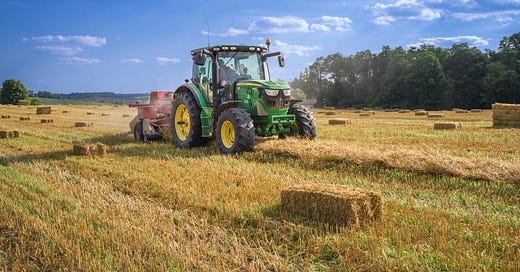Dear readership,
you often hear that in order to be successful in the stock market you have to invest contrarily. That means not following the herd and looking for stocks that are ignored by the rest.
So far so good.
But let's take a step back and look at what the basic prerequisite for contrarian investing is, namely contrarian thinking.
Since thinking precedes action and successful investing takes place outside the mainstream, we should look for ideas for the right mindset outside the herd as well.
This brings us to today's lesson.
Let's consider the following example. Imagine you are a farmer. And your farm generates $100,000 per year in profit. And you can roughly estimate in what range the farm will yield you money in the coming years.
You also know that despite your best efforts the unexpected can always happen and you can have a very bad year. Bad weather or insects can destroy your crop. Now, would you assume that a bad year can cut the value of your farm in half?
Of course not, you already factored that in when you bought the farm. And it would be ridiculous to sell when you know that bad years are the exception and not the rule.
“You would not cut the value of a good farm in half just because bad weather conditions caused a crop failure in a single year.” - Phil Fisher -
Would you sell your farm to buy another farm because its crop in a certain year was better than yours? Imagine farmers would trade their farms every season with each other and chase the best crop.
Sounds dumb? Welcome to Wall Street.
"No reasonable person would expect a farmer to sell his farm in order to buy a different farm every decade, let alone every year or several times a year. As public-market investors, however, this "sitting on our hands" behavior is unusual." - Clifford Sosin -
Let's think a bit further. Would you sell your farm because a few kilometers away another farmer has sold his farm? I know that sounds silly, but that's exactly how many investors behave. They let themselves be influenced by the buying and selling behavior of others who are often not smarter than them.
To add a little depth to the theme of stupidity:
Would you buy a farm that has been turning a profit for years or one that has never turned a profit but is being touted by a farmers' magazine as the next big hit?
You get my point.
And yet, you still see people watching Jim Cramer’s show although he is known for promoting overvalued companies without substance.
Smart farmers don’t respond to what other farmers are doing because they know the value of their farm and have a rough idea of what it will produce in the coming years.
The next time a stock crashes, or even the entire market, ask yourself what a farmer would do. Would he sell his land immediately or focus on how the harvest will be in the coming season?
This mindset has helped me a lot and it can help you.
“If Investors' frenetically bought and sold farmland to each other, neither the yields nor prices of their crops would be increased. The only consequence of such behavior would be a decrease in the overall earnings realized by the farm-owning population because of the substantial costs it would incur as it sought advice and switched properties.” Warren Buffett
I hope you learned something today.
Until the next issue (which will be about market-beating strategies again). 👋
If you enjoy The Onveston Letter, let me know by clicking the “Like” button ❤️.
And if you aren’t a subscriber yet, then sign up below to not miss out on future articles.
For the new readers: Check all my previous posts here
Disclaimer: This analysis is not advice to buy or sell this or any stock; it is just pointing out an objective observation of unique patterns that developed from my research. Nothing herein should be construed as an offer to buy or sell securities or to give individual investment advice.




One other thing: All the trading of farms would just create more friction in the system, as the middlemen (and middlewomen) get rich along the way while the farmers waste productivity by having to pay those fees and understand the new crops they now are farming.
Great analogy!!!